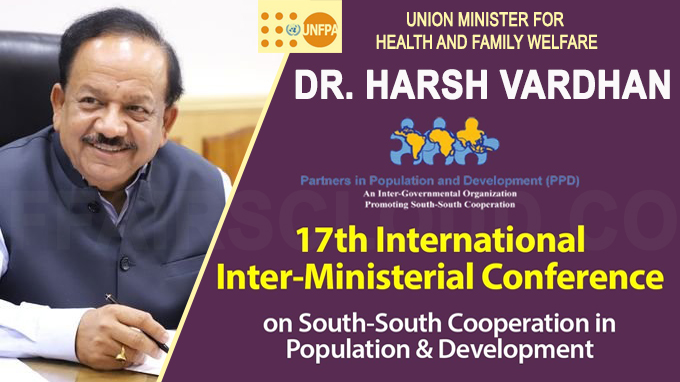
On December 8, 2020, the 17th International Inter-Ministerial Conference on South-South Cooperation in Population and Development titled “Nairobi Commitments and the 2030 Agenda: Taking stock and looking ahead to post COVID-19 Crisis” was held virtually.
The ministerial session for the same was held on “Promoting South-South Cooperation for Attaining Nairobi Commitments and the Agenda 2030” which was chaired by Dr. Faisal Sultan, The Federal Minister of the National Health Services, Regulations and Coordination of the Government of Pakistan.
- The conference was co-sponsored by Partners in Population and Development (PPD), the United Nation Population Fund (UNFPA), and National Health Commission of China (as Chair of PPD).
- The sponsors organized three sessions for this conference. The Technical Session 1 was held on November 19, 2020, the Technical Session 2 was held on November 27, 2020 and the last one was the Ministerial session (above mentioned).
- It should be noted that PPD plays an important role to enable such dialogue to take forward the common agenda of ‘Health for All’.
During the session, Keynote Address was delivered by internationally acclaimed and outstanding leaders in health, population and development. The Indian side was represented by Union Minister Dr. Harsh Vardhan, Ministry of Health and Family Welfare (MoHFW). It should be noted that he is the Vice-Chair of the PPD Board.
- The conference and the session were concluded with the adoption of Call for Action.
Key Points from Dr. Harsh Vardhan Address:
–India reaffirmed its commitments made at the Nairobi Summit 2019 which include ending all maternal deaths, fulfilling unmet needs for family planning, reducing gender-based violence and ending harmful practices against women and girls by 2030.
–India is ensuring Universal Health Coverage through its flagship programme ‘Ayushman Bharat’.
–Under the Ayushman Bharat National Health Protection Scheme (AB-NHPS) or the Pradhan Mantri Jan Arogya Yojana (PMJAY), the government is providing health care coverage of US$7000 per family per year covering over 500 million Indians.
- It is the world’s largest health assurance scheme.
–The Central Government is also increasing the range of contraceptives and improving accessibility of family planning services through mass awareness campaigns, and counseling.
–For achieving the Sustainable Development Goal (SDG) target of reducing Maternal Mortality Rate to less than 70 by 2030, the govt has implemented “Surakshit Matritva Aashwasan (SUMAN)” which means Safe Motherhood Assurance.
–India already pledged 3 billion US Dollars by 2020 for improving reproductive health services.
–India’s National Health Policy 2017 aims at raising public health expenditure to 2.5% of the GDP (Gross Domestic Product).
–India is also dedicated towards providing quality, timely and disaggregated data, investing in digital health innovations, and improvement of data systems by 2030.
What are Nairobi Commitments?
In November 2019, Nairobi Summit on International Conference on Population and Development (ICPD) 25 was held in Nairobi, Kenya which resulted in more than 1,200 concrete commitments to help ensure sexual and reproductive health and rights for all by 2030.
What are Sustainable Development Goals?
In September 2015, the United Nations General Assembly (UNGA) adopted the 2030 Agenda for Sustainable Development that includes 17 Sustainable Development Goals (SDGs) intended to achieve by 2030. Under them GOAL 3 is for Good Health and Well-being. Click Here for list of 17 SDGs
About Partners in Population and Development (PPD):
Chair, PPD Board– H.E. Dr. Li Bin
Headquarter– Dhaka, Bangladesh
Current Members– 26 (Bangladesh, Benin, China, Colombia, Egypt, Ethiopia, The Gambia, Ghana, India, Indonesia, Jordan, Kenya, Mali, Mexico, Morocco, Nigeria, Pakistan, Senegal, South Africa, Sri Lanka, Thailand, Tunisia, Uganda, Vietnam, Yemen and Zimbabwe)
About United Nation Population Fund (UNPF):
Executive Director– Dr. Natalia Kanem
Headquarters– New York, United States (US)




